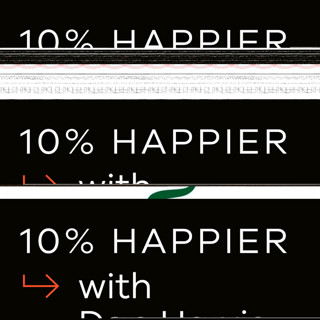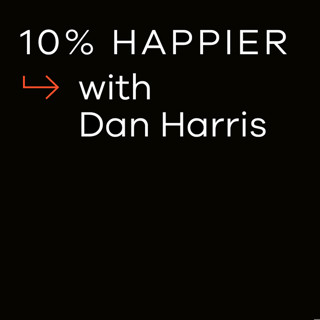
Jerks at Work | Amy Gallo
New episodes come out every Monday, Wednesday, and Friday for free, with 1-week early access for Wondery+ subscribers. --- This is the third installment in our Work Life series. In other episodes, we cover topics like imposter syndrome, whether mindfulness really works at work, and whether you should actually bring your whole self to the office. Today's episode is one that many of us struggle with: interpersonal conflict at work. Our guest is a true ninja on this topic. Amy Gallo is a workplace expert who writes and speaks about interpersonal dynamics, difficult conversations, feedback, gender, and effective communication. Gallo is a contributing editor at Harvard Business Review and the author of a new book, Getting Along, How to Work with Anyone, Even Difficult People. She's also written the The Harvard Business Review Guide to Dealing With Conflict, and she cohosts the Women at Work podcast. In this episode we talk about: Why quality interactions at work are so important for our professional success and personal mental health Why Gallo believes one size doesn’t fit all when it comes to dealing with difficult people in the workplace Why avoidance isn’t usually an option What the research tells us about work friendships Why we have a tendency to dehumanize people who have more power than us Why passive aggressive people can be the most difficult to deal with The provocative question of whether we are part of the problem when work conflict crops up And, a taxonomy of the eight different flavors of difficult coworkers, including the pessimist, the victim, the know-it-all, and the insecure boss — with tactics for managing each. Full Shownotes: https://www.tenpercent.com/podcast-episode/amy-gallo-576
20 Mars 20231h 11min

Do You Feel Like an Imposter? | Dr. Valerie Young (Co-Interviewed by Dan’s Wife, Bianca!)
New episodes come out every Monday, Wednesday, and Friday for free, with 1-week early access for Wondery+ subscribers. --- The phrase imposter syndrome has increasingly crept into the culture. If you haven’t heard of it, it basically means that you feel like you’re a fraud, despite evidence to the contrary. As this term has gained more purchase in our culture, it’s also been subjected to an increasing amount of scrutiny and criticism, and also confusion. So, today we’re going to try to cut through some of that with Dr. Valerie Young, who’s been an internationally recognized expert on imposter syndrome since 1982. Young is the co-founder of the Imposter Syndrome Institute. She wrote a book called, The Secret Thoughts of Successful Women: Why Capable People Suffer from the Impostor Syndrome and How to Thrive in Spite of It. As you’ll hear her explain, imposter syndrome is not just for women — men deal with it, too, as do many other people along the gender spectrum. This is the second installment of our ongoing work/life series. In this episode we talk about: The three things that define impostor syndrome Dr. Young’s contention that imposter syndrome impacts both men and women, but tends to hold women back more What it means to shift from impostor thinking to thinking like “a humble realist” Why we need to learn to reframe competence Whether or not impostor syndrome is limited to the professional sphere The impact of identity/social group Three tools for dealing with imposter feelings Whether or not imposter feelings ever go away What to do if you’re in a relationship with someone with imposter syndrome And whether there are any upsides to imposter syndrome Full Shownotes: https://www.tenpercent.com/podcast-episode/valerie-young-574
15 Mars 20231h 5min

Scott Galloway on: The Impact of Work on Mental Health, the Role of Luck in Success, and How Much is Enough
New episodes come out every Monday, Wednesday, and Friday for free, with 1-week early access for Wondery+ subscribers. --- This is the first of a four part series on work that we’re calling, “Work Life.” Work can play a huge role in our sanity and happiness, or lack thereof. So today we're going to tackle some common and thorny questions with a guy who has been extremely successful at work and now teaches other people how to do so. We talk about questions such as how much work life balance should we really strive for? Is hustle culture really dead? What's the role of luck in success? How much is enough and should you bring your whole self to the office? Scott Galloway is a professor of marketing at NYU's Stern School of Business. He's also a serial entrepreneur. He's founded nine companies, including Profit, Red Envelope, and Section Four. He's served on the boards of directors of the New York Times Company, Urban Outfitters and Panera Bread. He's the best-selling author of many books, including, The Algebra of Happiness, Post Corona, and his latest book, which is called Adrift: America in 100 Charts. He's also the host of two podcasts, Prof. G. and Pivot. The latter, Pivot, which he co-hosts with the legendary tech reporter Kara Swisher. In this episode we talk about: Why work is such a big factor in determining our mental health What’s the number one retention factor at work How capitalism pushes us towards living to work rather than the other way around Why Galloway believes men’s sense of self-worth is so often (maybe too often) based on their ability to earn Where he stands on the idea of “bringing your whole self to work” How to get over being fired His thoughts on side hustles, work/life balance and whether remote work will stick around post COVID Why he says being in the office is important for young workers if they want to get ahead, especially young men Why, despite making a great living, he still has economic anxiety The rare moments when he is able to enjoy himself and say, “this is enough” His addiction to the approval of others How Galloway handles his critics, while retaining his willingness to go out on a limb and be controversial Full Shownotes: https://www.tenpercent.com/podcast-episode/scott-galloway-573
13 Mars 202350min

What Is Holding You Back From Greatness? | Lewis Howes
New episodes come out every Monday, Wednesday, and Friday for free, with 1-week early access for Wondery+ subscribers. --- It’s hard not to like Lewis Howes. He’s extremely open about his personal struggles, from childhood trauma to romantic challenges, from family drama to failure and self-doubt. Lewis is a voracious learner, relentless in his pursuit of his interests–and he’ll bust his ass to get to the bottom of things in his own life. His main area of interest is what he calls greatness. He hosts a podcast, a very popular one, called The School of Greatness. He has spent many many years interviewing people who have excelled in all sorts of areas and has become a true student. Lewis now has a new book, called The Greatness Mindset, in which he shares what he’s learned via all of these interviews and his own personal work. In this episode we talk about: The source of Lewis’s interest in greatness The difference between a powerless mindset and a greatness mindset The pernicious impact of self-doubt How to counter your inner critic via a ‘contract with yourself’ How to face your fears The importance of mission and purpose Where selfishness fits into finding your mission and purpose And we have a friendly debate about the law of attraction Full Shownotes: https://www.tenpercent.com/podcast-episode/lewis-howes-571
8 Mars 202353min

You Are Not a Sh*tty Person | Carla Naumburg
New episodes come out every Monday, Wednesday, and Friday for free, with 1-week early access for Wondery+ subscribers. --- There’s so much compelling research behind the notion of self compassion. Even though many of us think we need an internal cattle prod in order to retain our edge, research shows that people who have a supportive inner attitude — who have their own back — are more resilient and effective. Not to mention happier. And nicer. And yet, it is easy for skeptics to be turned off by some of the language and practices of self compassion. So today we brought in a guest who puts it in plain English, and is very funny. Carla Naumburg PhD is a clinical social worker, author, and mother. She has a lot to say about self compassion, and she does so in a way that skeptics will find appealing. One other note about Carla. A lot of her books are directed at parents, especially parents who are self critical. But this episode is aimed at everybody. We do talk a little bit about parenting at the end, but it’s not the main focus. Just so you have it, her books have titles such as: How to Stop Losing Your Sh*t with Your Kids and You Are Not a Sh*tty Parent. It’s common for parents to think they suck. It’s also common for humans to think we suck. That we are somehow terrible people. Sit back, relax, and let Carla disabuse you of that notion. In this episode we talk about: What Carla calls “shitty human syndrome” Asking ourselves, what do I need right now? How, for skeptics, the data on the effectiveness of compassion practices is a powerful incentive. The third arrow of denial and distraction The very human problem of not knowing how to deal with our feelings. Using “noticing, connection, curiosity, and kindness” as ways to get super clear about the practice of self-compassion Curiosity as the antidote to judgment How loving-kindness ties into the ability to treat ourselves with self-compassion. Kinder self-talk Practicing self-care by setting boundaries Single tasking as a strategy for decreasing stress And, using acronyms like SNAFU and KISS as a simple way to quickly access complicated thoughts Content Warning: This episode contains explicit language. There is a clean version over on the TPH app and website. Full Shownotes: https://www.tenpercent.com/podcast-episode/carla-naumburg-570
6 Mars 20231h 14min

The Many Benefits of a “Paradox Mindset” | Dolly Chugh
New episodes come out every Monday, Wednesday, and Friday for free, with 1-week early access for Wondery+ subscribers. --- The human animal doesn’t love paradox. We love a clear, simple story. Us versus them. Good versus evil. But life is rarely like that. This is especially true when it comes to wrestling with history. Our guest today calls it the patriot’s dilemma. How do you love your country while also acknowledging the painful and horrifying stuff that has happened in the past? Dolly Chugh is a professor at the New York University Stern School of Business where she teaches MBA courses in leadership and management. This is her second time on the show. The last time she came on, she spoke about the concept of being “good-ish.” One of the reasons we get defensive when people criticize us is that we feel like it’s a threat to our precious notion of being a good person. But if you have a good-ish mindset, then there’s always room to grow. Her new book, A More Just Future, encourages us to do that for America. Content Warning: This episode includes brief mentions of slavery and violence. In this episode, we talked about: Why Dolly was scared to write this book What the home team bias is and how it shows up when we think about our past What belief grief is The “long time ago illusion” And, what Dolly calls being a gritty patriot Full Shownotes: https://www.tenpercent.com/podcast-episode/dolly-chugh-568
1 Mars 202356min

Jonathan Haidt on: The Upside of Striving, How to Build a Stronger Mind, And What to Do with Ideas You Hate
New episodes come out every Monday, Wednesday, and Friday for free, with 1-week early access for Wondery+ subscribers. --- Usually episodes of this show are organized around one big question, but today’s guest, Jonathan Haidt, is just too interesting for one clear focus. In this episode, we dig into a ton of fascinating topics, including: why it can make you happier to see your own irrationality and hypocrisy, the value of interacting with ideas you do not like, how to navigate social media sanely, how to get ahead at work (and stay happy in the process), the upside of striving, the wisdom of the Stoics, and more. Jonathan Haidt is a renowned social psychologist from New York University’s Stern school of business and the author of many books, including: The Happiness Hypothesis: Finding Modern Truth in Ancient Wisdom, The Righteous Mind: Why Good People are Divided by Politics and Religion, and The Coddling of the American Mind: How Good Intentions and Bad Ideas are Setting Up a Generation for Failure. Since 2018, he’s been studying the contributions of social media to the decline of teen mental health and the rise of political dysfunction. One other note: heads up that this conversation includes mentions of self-harm and suicide. In this episode we talk about: Haidt’s elephant and rider metaphor that explains how our minds’ operate How to use different techniques from hypnosis to Buddhist and Stoic practices to tame our unconscious Why we’ve evolved to be hypocrites and how admitting our flaws can help us come out ahead Buddhism as a counterpoint to our success oriented culture The deleterious effects of social media on democracy and young people’s mental health Full Shownotes: https://www.tenpercent.com/podcast-episode/jonathan-haidt-567
27 Feb 202353min

A Radical Alternative to Revenge | sujatha baliga
New episodes come out every Monday, Wednesday, and Friday for free, with 1-week early access for Wondery+ subscribers. --- Very often, when somebody pisses us off, our first instinct might be to plan some sort of revenge even if we rarely, if ever, actually follow through with it. Obviously, the trait of revenge seeking is counterproductive and it happens to also feel terrible. All the great wisdom traditions tell us that we should be forgiving instead and this isn’t just some sort of finger wagging from the morality police; it’s just straight up good advice. It’s in your best interest not to be coiled up inside endless revenge fantasies. Of course, this is all easier said than done. Today, though, our guest, sujatha baliga, both says it, and does it. She has an extraordinary story: she was horribly abused by a family member, and then, after an encounter with his Holiness the Dalai Lama, learned how to forgive the seemingly unforgivable. What’s more, she now helps other people do that. Perhaps, starting now, even you. sujatha baliga is a long time Buddhist practitioner and internationally recognized leader in the field of restorative justice. She was named a 2019 MacArthur Fellow and is working on her first book. Content Warning: This episode includes multiple references to violent and traumatic experiences, including homicide and incest. In this episode we talk about: Her personal story, including her early experience with sexual assault within her family Her life-changing encounter with his Holiness the Dalai Lama, and her experience with learning to forgive with the help of meditation Her experience working in the criminal justice system Her definition of restorative justice, why she believes we need it, and the three key questions it asks in each case Whether there is evidence that restorative justice works The limits of restorative justice What happens if someone who is the victim of a crime does want traditional punishment or even revenge How you can apply what she’s learned in her life — including her time in the field of restorative justice — to our own lives And a specific meditation practice that can help you do it Full Shownotes: https://www.tenpercent.com/podcast-episode/sujatha-baliga-565
22 Feb 202356min





















